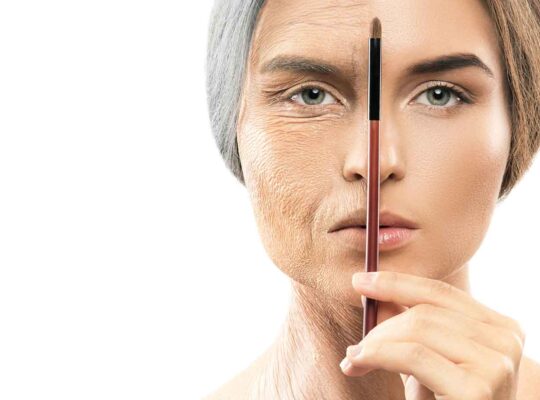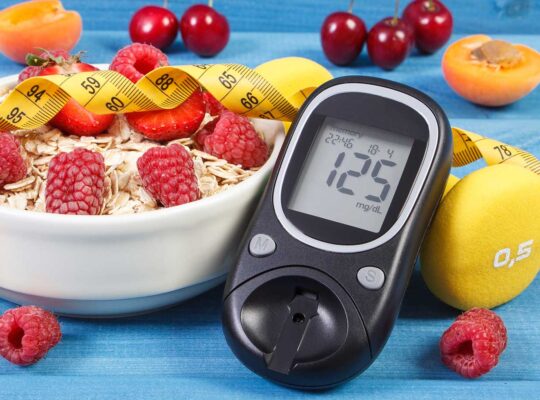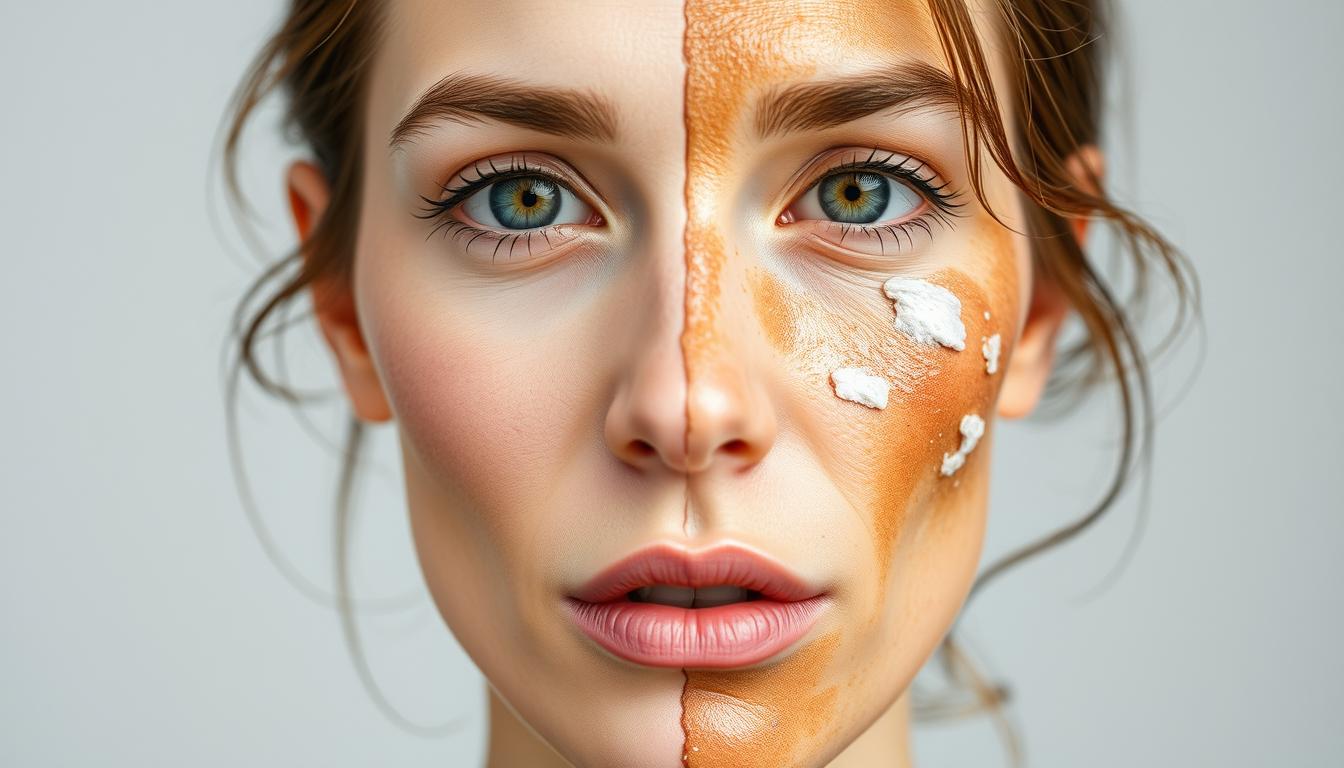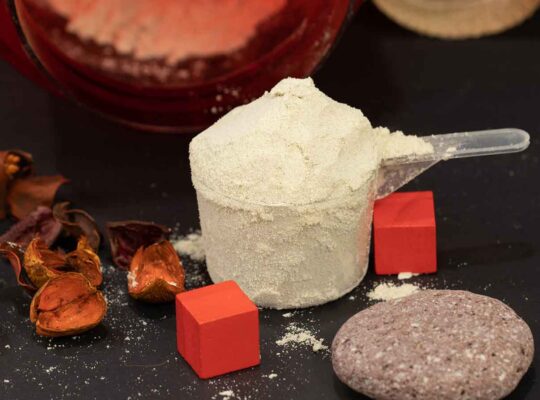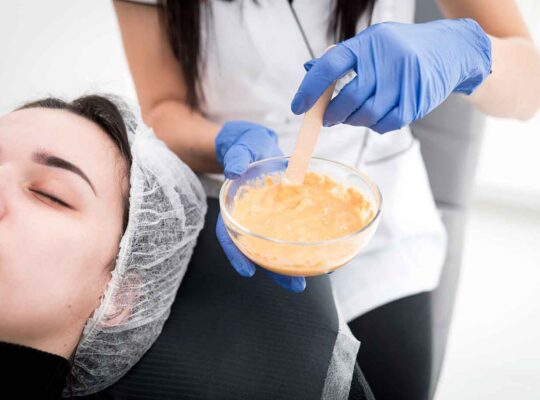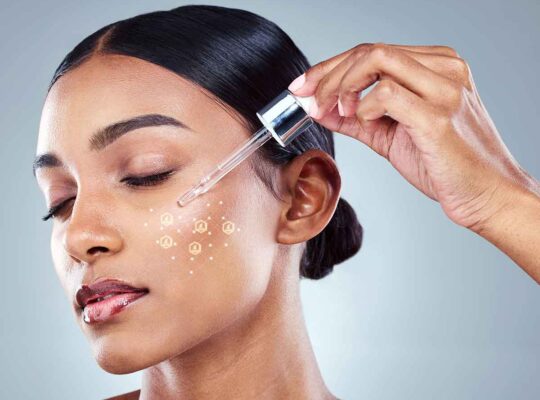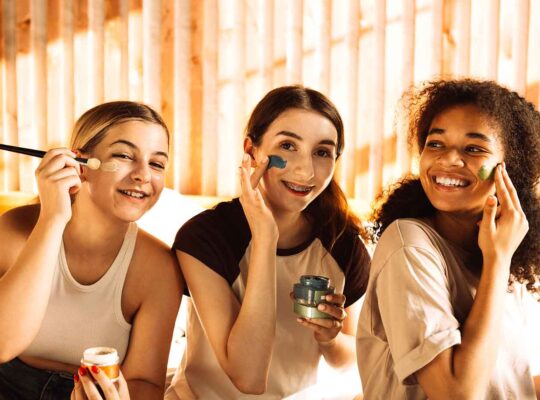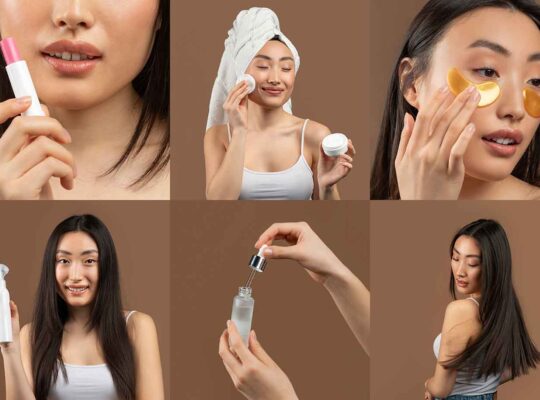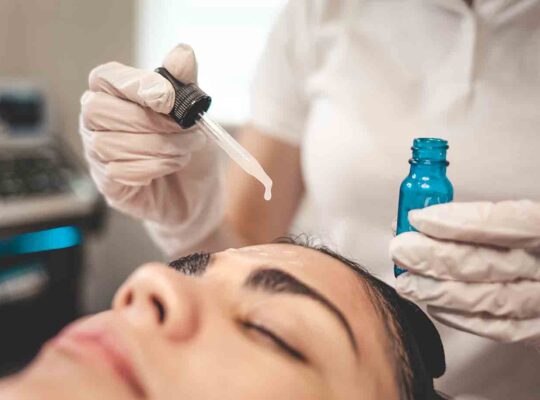Have you ever thought your skin is just a shield? Think again. Did you know that your skin produces crucial vitamin D just from being in the sunlight? This vitamin is vital for keeping your bones strong. It shows how even the simplest parts of your daily routine can affect your skin’s health. Whether you love your skincare routine or think of it as just another task, your skin is working hard. It’s not just a barrier; it’s a key player in your overall health.
Many people don’t realize that simple actions can reveal health issues through the skin. For instance, skin problems like rashes or discoloration can be signs of underlying health concerns. These issues can tell us a lot about our health, all through our skincare habits. While the sun gives us essential vitamin D, it also speeds up skin aging and increases the risk of skin cancer. This shows the tricky balance between getting healthy, glowing skin and protecting it from harm in our daily routines.
Have you ever considered how much sunbathing or even washing your hands too much affects your skin? Over-washing can strip away the natural oils your skin needs, leading to dryness. And too much UV exposure is linked to a higher risk of skin cancer. Making smart choices every day can help you achieve that glowing skin you want, starting with understanding how your routines impact your skin.
This look into skin health shows just how much your daily life affects your skin. From the food you eat to the sunscreen you use, these choices can either help or hurt your skin. As you continue to learn more, remember that your skin tells the story of your lifestyle. Understanding this story is key to living a healthy life.
Taking care of your skin isn’t just something extra; it’s essential. This means using sunscreen with at least SPF 15, eating well, and following a good skincare routine. Each step is crucial for keeping your skin healthy and strong.
So, get ready to learn how to turn your daily routine into a powerful tool for keeping your skin healthy for years to come.
Understanding the Skin: Your Body’s Largest Organ
The skin is amazing for its protective nature and strength. It keeps us healthy and shows how well we’re doing physically. This important organ has a complex structure. It protects us from germs, makes Vitamin D, and helps us feel things. Knowing about skin health and daily habits can make it better and last longer.
Our skin constantly regenerates, with new cells coming up from the bottom every four weeks. This shows why a good skin care regimen is key. Underneath, the dermis has collagen and elastin, which keep the skin strong and elastic. These elements help with many skin problems, like aging or damage from the environment.
For better skin, eat foods full of antioxidants and healthy fats, drink plenty of water, and avoid too much sun. Also, clean, moisturize, and use a broad-spectrum SPF daily. Watch for dry spots or sensitivity, as they might mean you need to see a doctor.
By following these steps, you keep your skin looking young and strong. These skin health and daily habits create a routine that feeds and shields your skin. This helps it stay tough against pollution and stress.
- Regularly check skin condition to identify any unusual changes or abnormalities.
- Use skincare products suitable for your skin type and remember to check their expiration dates.
- Opt for showers in lukewarm water and follow up with a moisturizer to lock in hydration.
With ongoing care and focus, your skin can show how healthy you are inside and out. Daily skin care is key to your overall health, not just how you look.
The Protective Role of Daily Sunscreen Application
Using the right sun protection is key to keeping your skin healthy and safe from UV damage. Learning the 10 ways of caring for the skin and using sunscreen daily can make your skin look better in just 7 days. It also brings many 5 benefits of skin care. Sunscreen protects against premature aging and lowers the risk of skin cancer.
Preventing Photoaging and Skin Cancer
Sunscreen is a strong ally against early aging and skin cancer. Applying sunscreen every day protects your skin from UVA and UVB rays. This helps prevent wrinkles and fine lines. It also lowers the chance of getting skin cancer, which affects over 5 million people in the U.S. each year.
Choosing the Right Sunscreen
Finding the right sunscreen can be tricky, but it’s crucial for protecting your skin. Experts suggest using a broad-spectrum sunscreen with SPF 30 or higher. For those spending a lot of time outside, an SPF 60 or higher is better. Pick a sunscreen that fits your skin type and your activities, like water-resistant or non-comedogenic options.
| Skin Type | Recommended SPF | Additional Advice |
|---|---|---|
| Oily/Acne-Prone | 30+ SPF | Non-comedogenic products to prevent clogged pores |
| Dry Skin | 30+ SPF | Moisturizing sunscreens with hydrating properties |
| Sensitive Skin | 30+ SPF | Mineral-based ingredients like zinc oxide or titanium dioxide |
| Outdoor Activities | 60+ SPF | Water-resistant formulas for better durability |
Adding sunscreen to your daily routine is more than just sun protection. It’s about taking care of your skin for the long run. By following 10 ways of caring for the skin, sunscreen becomes a must-have. It leads to better skin in 7 days and offers great 5 benefits of skin care.
Nutrition’s Impact on Your Complexion
Looking after your skin naturally means more than just using creams and lotions. What you eat is also key. Eating foods full of vitamins and antioxidants can make your skin healthier and look better. Adding these foods to your meals can help fight common skin problems.
The Science of Skin-Boosting Foods
Foods like berries and spinach are packed with antioxidants. They help fight oxidative stress, which can cause skin aging and inflammation. Foods rich in Vitamins A, C, and E help repair cells, increase collagen, and protect against UV rays.
Vitamin C in citrus fruits and strawberries is important for making collagen. This makes your skin more elastic, looking younger and firmer.
Eating a lot of fat and sugar can lead to more acne. Eating a balanced diet can prevent inflammation that causes skin issues like acne and rosacea.
Hydration and Skin Health
Drinking enough water is key to good skin. It keeps your skin moist and strong. It also helps reduce wrinkles and flush out toxins that can cause blemishes.
Adding omega-3 fatty acids from fish like salmon helps your skin hold moisture better.
Studies show that eating right is crucial for better skin. Eating less sugar and more fruits, veggies, and healthy fats is good for your health and skin. This approach can make your skin look healthier and more glowing.
Skincare Rituals and Their Effect on Dermis Integrity
Learning how to care for your skin is key, especially when doing it at home. A good skincare routine helps keep your skin healthy and beautiful. It also protects it from harm. Let’s look at the basics of a skincare routine that keeps your skin looking great.
Cleansing and Moisturizing: The Basics
Cleansing is the first step in skincare, removing dirt and makeup. Choose a cleanser that fits your skin type to keep it healthy. After cleansing, moisturizing is next to keep your skin hydrated and elastic.
Using the right moisturizer for your skin type locks in moisture and protects it from harm. This keeps your skin looking its best.
Exfoliation: Promoting Skin Regeneration
Exfoliating helps your skin renew itself by removing old skin cells. But, be careful not to exfoliate too much or too often. Use natural exfoliants like sugar or nut shells for a gentle approach.
Choosing the right products for your skincare is crucial. Look for ones without harsh chemicals and full of natural ingredients. This helps your skin stay healthy and supports the planet too.
Regularly cleansing, moisturizing, and exfoliating your skin makes it healthier and more beautiful. Adding these steps to your daily routine helps keep your skin looking great for years.
How Smoking and Alcohol Consumption Reflect on Your Skin
Keeping up with a good skincare routine is key, especially when avoiding smoking and too much alcohol. These habits harm your skin, causing early aging and other skin problems.
Smoking packs over 7,000 chemicals that hurt your skin and other organs. It cuts off blood flow, reducing oxygen and nutrients to your skin. This makes your skin look old and unhealthy. Smoking also damages skin fibers, making it lose its elasticity and strength.
Drinking too much alcohol dries out your skin, making it look dull. It also makes your pores bigger, leading to more blackheads and whiteheads. Plus, it can make rosacea worse, causing redness and visible blood vessels on your face.
Here’s how smoking affects your skin:
- Smokers are more likely to develop squamous cell carcinoma (SCC) by 52%.
- There is an 85% increase in the risk of periodontitis for smokers, which affects your gums and skin’s health.
- Smoking can make skin conditions like psoriasis worse, and smokers make up about 95% of those with Palmoplantar pustulosis (PPP).
Quitting smoking has many benefits for your skin. It makes your skin look brighter and younger by improving moisture and reducing wrinkles. It also lowers the risk of skin problems. Choosing to quit smoking and drink less is a smart move for your skin’s health and beauty.
“Your skin reflects your habits; healthier choices lead to a healthier appearance,” according to the American Academy of Dermatology Association.
Living a healthy life means avoiding harmful substances. Adding a balanced diet, staying hydrated, and regular skincare helps. These steps are key for keeping your skin elastic and full of life, ensuring you look great as you age.
Daily Routine Impact Skin Health: Habits to Adopt and Avoid
Understanding how the impact of daily routine on skin health is key. It helps you pick good habits and avoid bad ones. To keep your skin glowing and healthy, add positive habits to your daily life. Also, avoid habits that can harm your skin.
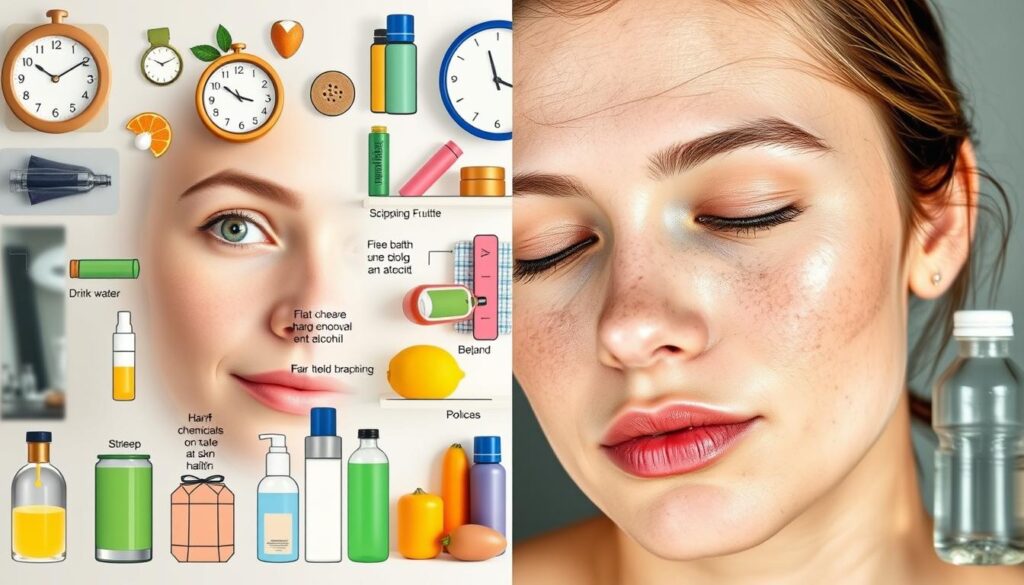
- Adopt Sun Protection: Use sunscreen with an SPF of 30 or higher to protect your skin from UV rays. Reapply every two hours outside to prevent skin aging and skin cancer.
- Maintain Hydration: Drink enough water since your body is about 60% water. It helps remove toxins and keeps your skin elastic and hydrated.
- Ensure Quality Sleep: Sleep for 7-9 hours each night for skin repair and renewal. Good sleep leads to healthier, glowing skin.
- Follow a Nutrient-Rich Diet: Eat foods full of vitamins and omega-3 fatty acids. These nourish your skin from the inside out.
- Engage in Regular Exercise: Exercise boosts blood flow, which feeds skin cells. This keeps your skin looking vibrant and healthy.
Some habits can harm your skin’s health:
- Smoking: It causes wrinkles, dull skin, and reduces skin elasticity.
- Excessive Alcohol Consumption: It leads to dehydration and inflammation, making your skin look dry and old.
- Skipping Sunscreen: Most premature aging comes from the sun. Always use sunscreen for a young look.
- Over-exfoliating: Exfoliate only once or twice a week. This keeps your skin’s natural barrier intact, preserving its health.
Adding these habits to your daily life can greatly improve your skin’s health. It can also prevent future skin damage. Always talk to experts like the estheticians at Dulce Lash to tailor your skincare to your needs.
The Importance of Quality Sleep in Skin Repair and Regeneration
Getting enough sleep does more than refresh your mind; it’s key to how to take care of your skin naturally. It helps make collagen, a protein that keeps your skin young and tight. This protein fights fine lines and wrinkles, and it’s made more during sleep.
Understanding Circadian Rhythms and Skin Cycles
Your skin has its own daily cycle, like the rest of your body. At night, it starts to repair and rejuvenate. This means it fixes damage from the day and regenerates cells faster. So, getting good sleep is crucial for how to take care of your skin naturally.
Dealing with Sleep-Deprivation Induced Skin Issues
Not sleeping enough can cause many skin problems. It can make you look older, with wrinkles and sagging skin. It can also make your skin look dull and dry.
| Effect of Sleep Deprivation | Impact on Skin |
|---|---|
| Increased Cortisol Production | Break down of skin collagen, leading to wrinkles and decreased firmness. |
| Decreased Skin Hydration | Dry, less elastic skin prone to irritation and redness. |
| Reduced Collagen Production | More visible fine lines, less youthful and vibrant skin. |
| Accelerated Aging Process | Sagging skin, deeper wrinkle formation, increased inflammation. |
| Worsening of Chronic Skin Conditions | Flare-ups in conditions like acne, eczema, and psoriasis. |
| Oxygen Reduction Around Eyes | Dilated vessels causing dark circles under the eyes. |
To fight these issues and help your skin heal, get a good sleep routine. Stick to a bedtime, use a quality mattress and pillows, and avoid blue light before bed. Also, try relaxing activities like reading or meditating before sleep.
Good sleep is a key part of how to take care of your skin naturally. By following these tips, you’ll improve your skin and overall health. It shows that true beauty sleep is real.
Managing Stress to Maintain a Healthy Epidermis
Stress impacts your health, including your skin’s condition. Knowing how stress affects your skin helps you improve your skincare routine and adopt healthy habits. This leads to a healthier epidermis and better overall health.
Identifying Stress-Induced Skin Problems
Stress can cause skin issues like acne, redness, and hives. It can also make eczema and psoriasis worse. Emotional stress can lead to rosacea and alopecia, showing why managing stress is key for your skin.
Stress Management Techniques for Better Skin
Managing stress is vital for skin health. Regular exercise, enough sleep, and mindfulness help your mental and skin health. Eating a balanced diet and staying hydrated are also important for skin health.

| Technique | Description | Benefits for Skin |
|---|---|---|
| Meditation | A practice of mindfulness or focused thought to achieve a mentally clear and emotionally calm state. | Reduces stress-induced skin conditions like acne and eczema by lowering cortisol levels. |
| Regular Exercise | Engaging in physical activities such as walking, yoga, or cycling. | Enhances blood flow, promoting skin detoxification and reducing aging signs. |
| Adequate Sleep | Maintaining a routine of 7-9 hours of sleep per night. | Supports skin repair and regeneration, reducing stress-related skin wear. |
| Healthy Diet | Incorporating foods rich in antioxidants, vitamins, and minerals. | Supports skin health by combatting oxidative stress and inflammation. |
Adding these stress management techniques to your daily life helps your mental and skin health. These habits help your skin recover from stress damage and keep it healthy and young.
Physical Activity and Its Radiant Effect on Skin
Regular physical activity is key for your health and helps your skin glow. When you exercise, your blood flows more, feeding your skin cells and removing waste. This boosts your skin’s health and helps you look great.
Sweating out impurities during exercise clears your skin. But, cleaning your skin well after working out is crucial to avoid acne. Use cleansers with salicylic acid and benzoyl peroxide to deep clean your pores. Wearing clothes made of synthetic materials like nylon can also help keep your skin clear.
| Concern | Cause | Solution |
|---|---|---|
| Acne and Breakouts | Sweat build-up | Use salicylic acid or benzoyl peroxide cleansers post-exercise |
| Skin Irritation | Tight clothing | Choose loose, breathable fabrics |
| Foot Blisters | Ill-fitting shoes | Get fitted for athletic sneakers at a specialized store |
| Dehydration | Insufficient water intake | Increase fluid consumption before, during, and after workouts |
| Excessive Sweating | High-intensity workouts | Use deodorants with aluminum chloride to reduce sweating |
Exercise does wonders for your skin, making it clear and elastic. But, protect your skin from harm and the sun. Use sunscreen when outside to prevent aging and skin cancer. Also, eat foods rich in antioxidants like vitamins A, C, and E to keep your skin healthy.
Adding exercise to your daily life boosts your health and makes your skin glow. Your skin reflects your overall health, and staying active leads to glowing skin. Start your journey to vibrant skin with every workout!
Conclusion
Looking after your skin is more than just about creams and lotions. It’s about changing your lifestyle for better health. By taking care of your skin at home, you can see big improvements in just 7 days.
More people are buying skincare products, showing they care more about their skin. In the US, sales went up by 13%. This shows how important skin health has become.
“The beauty of a skincare routine is not just in the products you use but also in the healthy habits you adopt daily.”
Studies show that sticking with a skincare routine really works. A study found that people’s skin got better after 28 days of a daily routine. They felt better overall, too.
| Study Phase | Participants Completed | Improvement Reported |
|---|---|---|
| 28-Day Skincare Regimen | 91 in National Representative group | Significant in Skin Condition |
| 42-Day Deprivation | 90 in National Representative group | Maintained previous improvements |
Many studies agree that using things like ceramides can help with dry and itchy skin. This shows that a good skincare routine can help now and in the long run.
- Start with a gentle cleanse to keep your skin’s pH balanced and clean.
- Use hydrating products that fit your skin type to keep it moist.
- Use special treatments for your skin issues with active ingredients.
By doing these things every day, you can get a healthy, young-looking skin. This makes your skincare efforts worth it.
Remember, the key to better skin is being consistent, mindful, and making smart skincare choices.
Elevating Your Skincare Knowledge: Key Takeaways
Your journey to better skin starts with understanding how your daily habits and choices affect you. It’s key to know that your skin acts as a shield for your body. Knowing your skin type is also crucial, whether it’s oily, dry, or normal.
Remember, improving your skin takes time, often weeks or even months. So, be patient and keep at it. Sticking to a daily skincare routine is vital for healthy skin.
Sun protection is a top priority among the 5 ways to care for your skin. Always use a broad-spectrum sunscreen with SPF 30 to protect against UV rays. When using products like mandelic acid toners, start slow and limit their use to avoid irritation.
Choosing eco-friendly beauty products is also important. Look for brands that focus on sustainability and ethical practices. This helps the planet and your skin.
Opting for an organic beauty routine tailored to your skin type is beneficial. You can go for simple routines with quality organic products or a minimalist approach. Customized skincare is a growing trend that meets your unique needs.
Learning about natural ingredients and their benefits can improve your skin and help the environment. By adopting these practices, you’re not just caring for your skin but also for the planet. This approach enhances your well-being and quality of life.
FAQ
How does my daily routine affect my skin health?
Your daily habits greatly affect your skin health. Things like cleaning, moisturizing, and using sunscreen are key. Also, what you eat, exercise, sleep, and how you handle stress matter a lot. Bad habits like smoking or drinking too much can harm your skin, making it age faster.
What are the key functions of the skin?
The skin protects us from harm, helps control our body temperature, lets us feel sensations, and makes vitamin D. It has three main layers: the epidermis, dermis, and subcutaneous tissue. Each layer plays a big part in keeping us healthy.
Why is daily sunscreen application crucial for skin care?
Using sunscreen every day shields us from UV rays that can cause wrinkles, skin cancer, and aging. It keeps collagen and elastin from breaking down. Use a broad-spectrum sunscreen with SPF 15 or higher and reapply often when you’re outside.
How do diet and nutrition impact skin health?
Eating foods full of antioxidants helps protect and keep skin elastic. Fruits, veggies, nuts, and whole grains are great for this. Vitamins A, C, and E help repair skin, make collagen, and protect against UV rays. Drinking plenty of water keeps your skin moist and looking good.
What are the basics of a good skincare routine?
A good skincare routine starts with cleaning to get rid of dirt. Then, moisturizing keeps your skin hydrated and elastic. Use products that are right for your skin type and are gentle. This keeps your skin healthy and happy.
How do smoking and alcohol affect skin appearance?
Smoking cuts down on blood flow, taking away oxygen and nutrients your skin needs. It also harms collagen and elastin. Drinking too much alcohol can dry out your skin and make it sag. Both habits make you look older and less healthy.
What daily habits should I adopt or avoid for better skin health?
Good habits include using sunscreen, eating well, staying hydrated, sleeping enough, managing stress, and exercising. Avoid smoking, drinking too much alcohol, and exposing your skin to harsh chemicals or damage.
Why is sleep important for skin repair?
Sleep is key for your skin to repair and regenerate naturally. It boosts blood flow to your skin and makes collagen, which fights aging. Not sleeping well can make your skin look dull, cause dark circles, and hurt your skin’s health.
How can I manage stress to improve my skin’s health?
To manage stress, try balanced living, regular exercise, mindfulness, and enough sleep. Less stress means less oil, less inflammation, and fewer skin problems like acne or redness.
Can physical activity really lead to better skin?
Yes, regular exercise helps your circulation, makes you sweat, and clears toxins. This can make your skin clearer and brighter. Exercise also lowers stress, which is good for your skin’s health and look.


